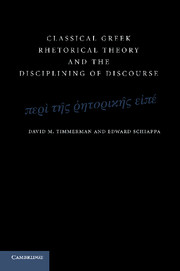Book contents
- Frontmatter
- Contents
- Acknowledgments
- 1 INTRODUCTION: Terms of Art as a Focus in the History of Rhetorical Theory
- 2 DIALEGESTHAI AS A TERM OF ART: Plato and the Disciplining of Dialectic
- 3 PHILOSOPHIA AS A TERM OF ART: Recovering Isocrates
- 4 TERMS OF ART FOR PUBLIC DELIBERATION: Dēmēgoria and Symboulē
- 5 TERMS OF ART AND THE INTERPRETATION OF TEXTS: The Disciplinary Status of the Rhetoric to Alexander
- 6 TERMS OF ART AND INFERRING THEORY: When Did the Parts of a Speech Become Formalized?
- 7 EPILOGUE
- References
- Index
4 - TERMS OF ART FOR PUBLIC DELIBERATION: Dēmēgoria and Symboulē
Published online by Cambridge University Press: 06 July 2010
- Frontmatter
- Contents
- Acknowledgments
- 1 INTRODUCTION: Terms of Art as a Focus in the History of Rhetorical Theory
- 2 DIALEGESTHAI AS A TERM OF ART: Plato and the Disciplining of Dialectic
- 3 PHILOSOPHIA AS A TERM OF ART: Recovering Isocrates
- 4 TERMS OF ART FOR PUBLIC DELIBERATION: Dēmēgoria and Symboulē
- 5 TERMS OF ART AND THE INTERPRETATION OF TEXTS: The Disciplinary Status of the Rhetoric to Alexander
- 6 TERMS OF ART AND INFERRING THEORY: When Did the Parts of a Speech Become Formalized?
- 7 EPILOGUE
- References
- Index
Summary
This chapter examines the characterization of public deliberation in Athens in fifth- and fourth-century texts. More specifically, we describe how such characterizations, which do not initially involve the use of a technical vocabulary, do so in the writings of Aristotle, particularly in the Rhetoric. That is, although various terms are employed broadly to refer to these activities in pre-Aristotelian authors in discussion of types of public discourse, the vocabulary becomes focused and fixed, and thus become terms of art, in Aristotle. In his use of these terms, in particular dēmēgoria and symboulē and their cognates, Aristotle gives shape to deliberative oratory, describing its characteristics, fashioning its boundaries, and laying out the purposes and values it is to pursue. To see these terms of art in operation most clearly, we begin with a description of democratic practice in Athens. And in describing this democratic practice, we seek a balanced description of Athenian democracy, as well as a map of the specific institutions associated with it.
Those who study the practice of political deliberation in classical Athens are often left with a feeling of ambivalence. On the one hand, there is much that seems worthy of praise, and much that we might want to promote, even today, in terms of democratic deliberation. For example, the meetings of the citizen body occurred regularly and the Assembly meetings, in particular, included a significant percentage of the Athenian citizenry.
- Type
- Chapter
- Information
- Publisher: Cambridge University PressPrint publication year: 2010



